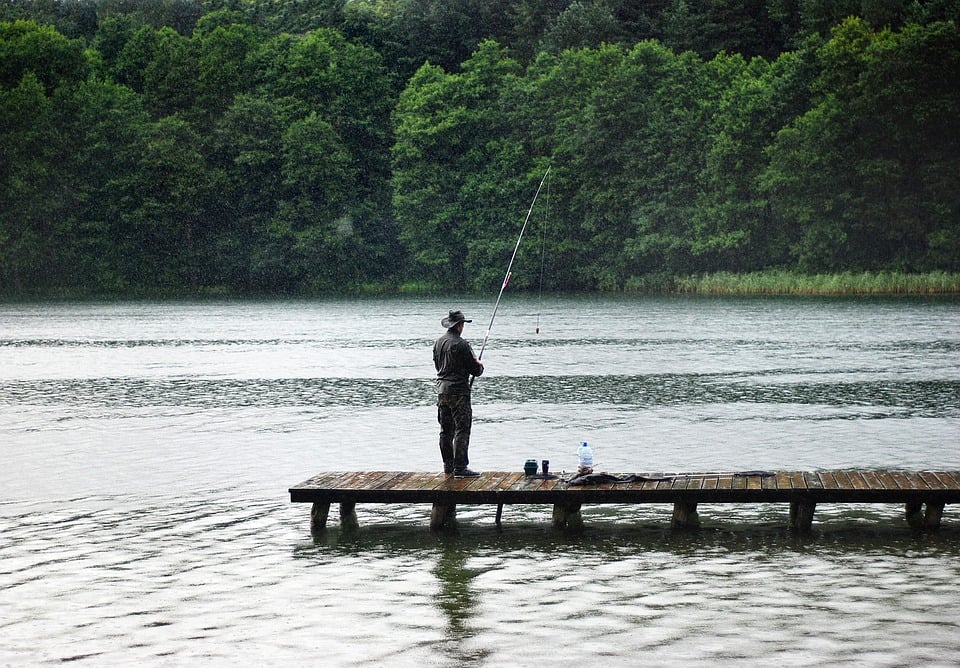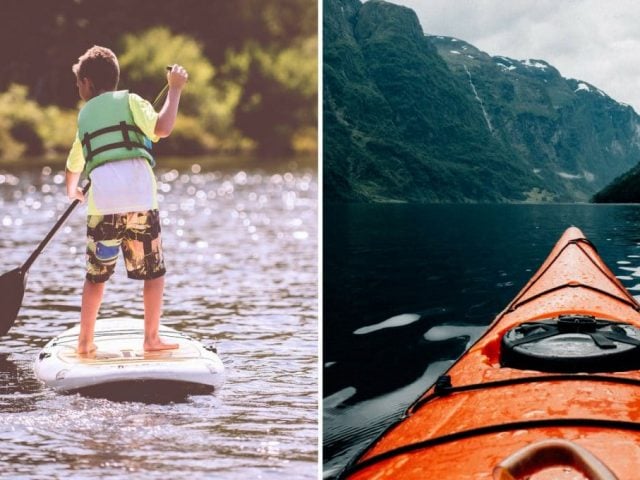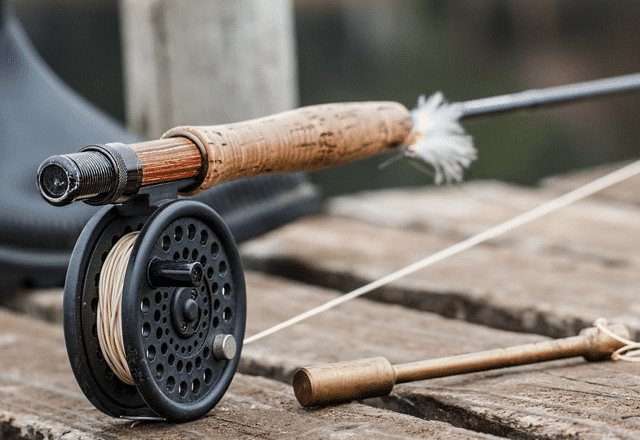One of the biggest misconceptions amateur anglers have is that fishing should be left for the nicest days. Fishing for bass in the rain is a great opportunity to enjoy a feeding frenzy. Rain changes the physical makeup of bodies of water by clouding up the lake and creating stronger currents.
When the water is cloudy, there is less of a chance that bass will detect your presence and they’ll be more prone to take your bait.
If you’re ready to get wet, let’s talk about some tips you should know when fishing in the rain.
1. Pay Attention to Runoff
The best place to fish a lake during a rainstorm is wherever runoff is occurring. When surface runoff hits the water, it brings additional nutrients from the soil, which attracts baitfish. Where you have baitfish, you have bass. Also, when runoff brings nutrients into the water, it usually fogs up the area leaving it muddy and cloudy. Cloudy water is ideal for bass fishing because they are naturally a nervous fish.
When you have cloudy conditions, the bass will not be able to see shadows or your boat, and that will lead to them biting more frequently because they are less afraid. Another great thing about runoff is, much of the lake’s bass will travel to wherever the baitfish are so you might find yourself in the middle of an enormous feeding session which will result in a ton of nibbling. Set your sights on any surface runoff and when the rain starts coming down, sit back and get ready to pull in some bass.
2. Bass Are More Aggressive: Play to That
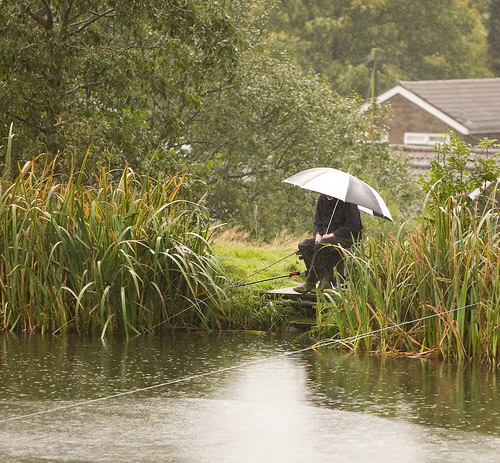
Since bass are more active on rainy days, you need to fish accordingly. Soaking your bait in the usual shady spot you usually fish will not work because the bass will not take it, they’ll pass right by on their way to the real feast.
When it’s raining, you need to present your bait much faster and cover more water because the bass are not staying in one place for very long. If you use a spinnerbait, consider speeding up your presentation or troll the top of the water.
Whatever bait or lure you use, you need to think like the bass are thinking when it rains. Bass are most likely traveling from wherever they were hiding out to a honey hole where the baitfish are hanging out. The next best thing behind finding the honey hole is catching them along the way by fishing one of their travel routes. To locate the travel route, you need to fish quickly and not spend too much time in any one location.
3. Topwater All Day
I’ll be honest; I am not a topwater angler. I don’t know what it is, but the technique and finesse required to make bass want to jump out of the water at my lure just doesn’t click for me.
There is one exception, though.
If you are fishing in the pouring rain, not a drizzle but a steady downpour you need to fish the top of the water. Bass are incredibly active when it’s raining heavily, so using a buzz bait or jitterbug is a great way to get attention and have bass take your bait.
The best strategy I have for rainy day fishing is to have two different baits in the water at all times. If you are fishing with a friend, make sure you are both not hitting the water with the same style lure. Your topwater should be in the lake at all times, and you want to fish common areas you would if it wasn’t raining with the topwater lure. You don’t have to follow the same quick travel strategy, but you want to keep working that bait as much as possible for as long as it keeps raining.
4. When it Rains: Spin to Win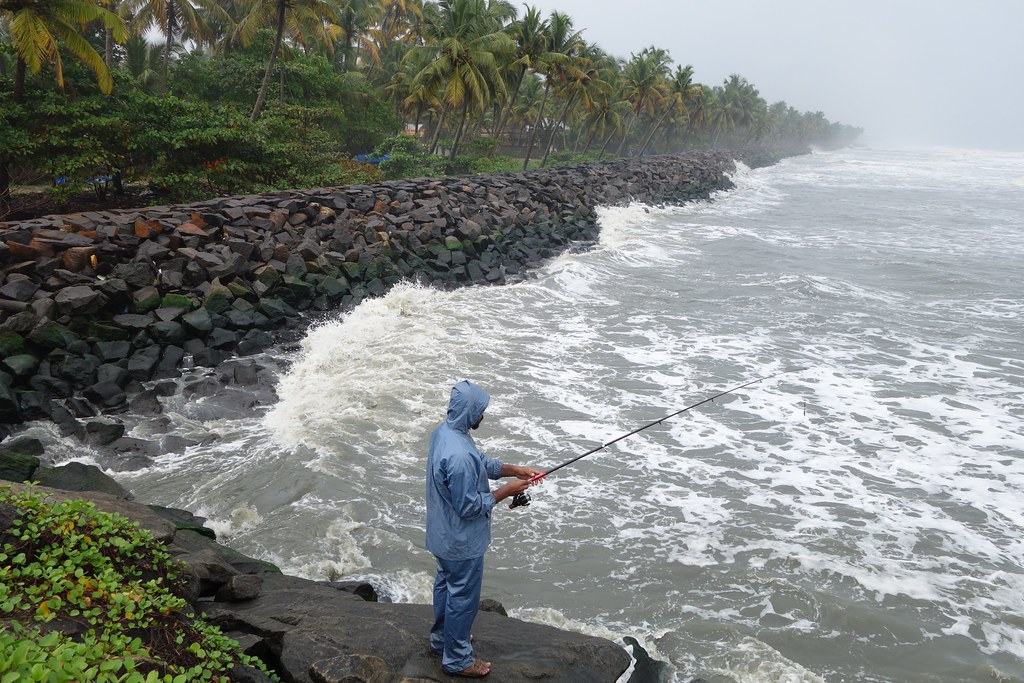
Spinners are versatile and have many different purposes. They are commonly used for bass fishing, and I think rainy day fishing steps them up to a whole new level. When it’s raining I love to work them right beneath the surface of the water and if you can locate a honey hole of baitfish, forget about it; you’ll be there all day.
Spinners have a smooth action that mimics a baitfish, and they vibrate and flash as they move which for lack of a better word, aggravates the bass. Because these lures create such a vibrant action and they reflect any amount of light they have, they are perfect for muddy and murky conditions when it’s rainy.
In my opinion, if you are fishing in the rain with someone else on your boat you should always have a spinnerbait and topwater lure in the water at all times.
5. Spread Out
I want to elaborate a little more on a previous point I made about hitting the water quickly. Many experts recommend fishing fast and not staying in one spot for too long when it rains because you need to keep up with the movement of the bass.
I spoke with an experienced angler in Pennsylvania recently; he told me “Some people are stubborn and they think they can always outsmart a bass but that’s just silly, you need to think exactly like they do and give them the benefit of the doubt. If you do what you want to do, you might get lucky, but you’ll catch a lot more fish if you do what they want you to do.”
I loved when he said, “do what they want you to do.” That’s what I’m trying to say when I say spread out your fishing throughout the day. We have in bashed into our heads that there are specific areas of every lake that are ideal for fishing, but when it rains, all bets are off.
You need to change your strategy completely, and you shouldn’t look at it as a bad thing, it’s a great thing. Fishing in the rain is the best fishing because they are most active and ready to eat.
 Bass Fishing after it Rains
Bass Fishing after it Rains
What if you are on the water and the rain stops? Should you keep following the same methodology to catch bass or should you change things up? Here are a few tips to carry your success over even if the sun comes out.
- Even more runoff – Yes, continue to fish any areas where runoff is present. Now you should also have increased visibility since the rain stopped you can locate optimal surface runoff areas. When you find areas that have mud lines you can bet there is all kinds of microorganisms and worms in that are which should lead the bass right over there. Focus on these areas for the rest of your fishing session.
- Strong currents = active fishing – Bass are attracted to fresh water that comes from the ground because it has more oxygen. When the water has more oxygen, it speeds up their metabolism, causing them to eat more and ultimately bite more. Use this to your advantage and locate the strongest surface runoff area and fish that like it’s nobody’s business. The stronger the current, the more oxygen the fish has, the more fish you will hook.
- Slow down – If you are hitting the water after a heavy rainstorm and the water level has started to recede, this is tough fishing because the bass most likely finished their frenzy and they are retreating deeper into the water. During this time, bass are less active and will not bite unless you get them going. It’s time to deploy a different strategy now. Switch over to slower jigging and vertical plastics and fish areas of cover like low hanging trees, vegetation, and stumps.
Final Thoughts
I’m glad I had a chance to clear the air on a lot of misconception about fishing in the rain. Next time you are plan to head out to the lake, and you put away your rods because it’s raining, think twice. Get excited to fish in the rain because you know the bass are biting and there is plenty of opportunities. Strap on the right gear and get out there!

